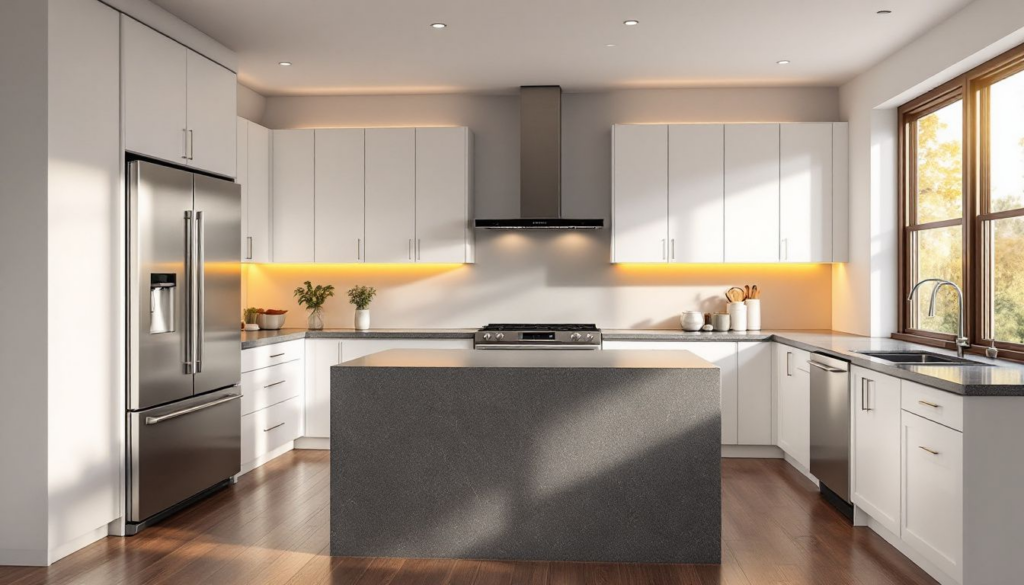Planning a home renovation? Discover essential tips for planning, budgeting, and hiring a contractor to ensure a seamless renovation.
Key Takeaways
- Proper planning is essential for a smooth home renovation, including setting clear goals and creating a detailed roadmap with timelines and budget.
- Budgeting wisely, including a cushion for unforeseen expenses and obtaining multiple contractor quotes, is critical to prevent financial strain during renovations.
- Choosing qualified contractors and understanding building permits and codes improves project compliance and quality, ensuring the renovation meets safety standards.
Planning Your Home Renovation Project
Planning is the cornerstone of any successful home renovation project. Proper planning not only sets the stage for a smoother process but also helps avoid common pitfalls that can derail your project. Many homeowners dive into renovations with a vision but without a clear plan, leading to frustration and unexpected problems. A well-thought-out renovation plan should begin with setting clear renovation goals and creating a detailed roadmap to guide the entire process.
Setting renovation goals involves more than just deciding what you want to change. It requires a deep dive into your day-to-day experiences and identifying specific improvements that will enhance your lifestyle. Once you have a clear vision, you can communicate these goals effectively with your contractor, ensuring everyone is on the same page.
Next, creating a detailed renovation plan that includes timelines, budgets, and specific project scopes will serve as your blueprint throughout the renovation. This plan should cover everything from electrical and plumbing work to finishes and system upgrades.
Setting Renovation Goals
Defining your renovation goals is the first step in the planning process. Consider what you want to achieve with your renovation project, whether it’s modernizing an outdated kitchen, adding a new bathroom, or creating a more functional living space. Your goals should reflect both essential needs and desired enhancements. Creating a Wish List that includes ‘must-haves’ and ‘nice-to-haves’ can help prioritize your renovation efforts.
Writing down your renovation goals also helps in setting realistic expectations and determining project priorities. For example, a kitchen renovation might aim to create a functional workspace with ample storage and modern appliances. Similarly, bathroom renovations could focus on improving usability and adding luxurious touches.
By clearly defining what you want to achieve, you ensure that your vision aligns with the work that will be done, leading to a more satisfying outcome.
Creating a Detailed Renovation Plan
Once your goals are set, the next step is to create a detailed renovation plan. This plan serves as a roadmap for your entire project, outlining every detail from start to finish. It should include specifics about electrical, plumbing, HVAC systems, finishes, and the overall project scope. For whole house renovations, consider structural revamps and system upgrades that enhance functionality and comfort.
A clear plan also involves estimating a rough start and completion timeline for your renovation project. Consulting with your contractor can help develop a more accurate timeline and identify potential delays.
Additionally, if you’re planning any DIY projects, ensure you seek proper guidance to avoid mistakes that could lead to costly setbacks. With a comprehensive renovation plan in place, you’ll be better prepared to manage the renovation process and achieve your desired results.
Budgeting for Your Renovation
Budgeting is a critical aspect of any renovation project. Without a clear budget, costs can quickly spiral out of control, leading to financial stress and incomplete projects. When setting your renovation budget, consider all possible expenses, including materials, labor, permits, and unexpected costs. It’s advisable to include a 20% cushion for unforeseen expenses to accommodate any surprises that arise during the renovation process.
Getting written estimates from multiple contractors can facilitate fair comparisons and help you make informed decisions. This approach ensures you get the best value for your money while keeping your project within budget.
Additionally, documenting and signing Change Orders can help manage any changes requested during the renovation. By carefully planning your budget and monitoring expenses, you can complete your renovation project without financial strain.
Determining Your Renovation Budget
Determining your renovation budget involves understanding the average costs associated with different types of projects. For example, the average cost for renovating a house that is 1,250 to 1,600 square feet ranges from $52,040 to $189,000. Kitchen renovations typically cost between $500 to $10,000 or more, depending on the materials and finishes chosen, while complete bathroom renovations can range from $1,000 to $25,000 or more.
When setting your budget, prioritize essential renovations over non-essential upgrades. Factors like the type of renovation, the amount of work required, and existing conditions can significantly influence costs.
For extensive renovations, consider securing funding options such as home improvement loans, which typically have lending limits between $50,000 and $100,000. Being cautious about down payments and payment methods can also protect you from potential financial risks.
Cost-Saving Tips for Renovations
Saving money during a renovation project requires strategic planning and smart choices. One effective strategy is to set a savings goal to ensure you can pay for renovations in cash, avoiding debt. Careful selection of cost-effective materials and utilizing contractors’ excess stock can lead to significant savings. For instance, using budget-friendly options like painting kitchen cabinets or adding a movable table as a faux island can transform your kitchen without breaking the bank.
DIY projects can also help reduce labor costs, resulting in substantial savings. Simple tasks like painting, demolition, and basic carpentry work can be tackled by homeowners with some experience. Additionally, finding discounted building materials at building supply auctions or using local stone and tile companies’ remnants can lower renovation costs for remodeling projects.
By incorporating these cost-saving tips, you can save money and achieve your renovation goals while staying within budget.
Choosing the Right Contractor
Choosing the right renovation contractors is crucial for the success of your home renovation project. A reliable contractor ensures that the renovation is completed on time, within budget, and to your satisfaction. When selecting a contractor, it’s essential to verify their credentials, including licensing, certification, insurance, and previous client feedback. This protects you from unnecessary risks and ensures that the contractor is qualified to handle your project.
Local contractors are often preferred due to their convenience, potential lower prices, and knowledge of local regulations and challenges. During the selection process, prepare for interviews with potential contractors by arranging face-to-face meetings and having a list of relevant questions ready.
By carefully evaluating contractor credentials and obtaining multiple quotes, you can make an informed decision and choose the right contractor for your renovation project.
Evaluating Contractor Credentials
Evaluating contractor credentials involves checking for licensing, certification, and insurance information. It’s also important to assess their reputation by looking at their standing on rating sites like the Better Business Bureau and reading reviews from previous customers. A contractor with a good reputation and positive reviews is more likely to deliver quality work and ensure customer satisfaction.
Ensure that the contractor has a portfolio of work that demonstrates their expertise in similar projects. This allows you to gauge their craftsmanship and attention to detail.
By thoroughly evaluating these credentials, you can select a qualified contractor who will meet your renovation needs and expectations.
Getting Multiple Quotes
Obtaining multiple quotes from different contractors is essential for ensuring competitive pricing and quality service. After receiving quotes, meet with each contractor for a detailed discussion to clarify expectations and understand their approach. This allows you to compare pricing, quality, and service, ensuring you make an informed decision.
Effective communication with contractors is crucial for project satisfaction. Contractors who are communicative and friendly tend to receive higher praise and deliver better results. By maintaining an open mind and carefully considering customer feedback, you can select the best contractor for your renovation project.
Understanding Building Permits and Codes
Building permits and codes are crucial for ensuring that renovations comply with safety and zoning laws. Failure to obtain the necessary permits can lead to penalties, increased costs, and potential safety hazards. Planning should encompass not just design but also labor, materials, and permitting requirements to ensure a smooth renovation process.
Understanding when you need a building permit and navigating local building codes can be challenging. However, working with architects and contractors who are familiar with these regulations can help streamline the process and ensure compliance. This not only protects your investment but also ensures the safety and quality of your renovation.
When You Need a Building Permit
Building permits are typically required for any renovation that changes the structure of your home. This includes constructing, demolishing, or altering materials in your home. Common renovations that require permits include knocking down walls, installing new doors and windows, and enclosing outdoor areas.
For larger projects, such as adding a new floor or building a sunroom, detailed plans showing structural integration with the existing building are necessary. Ensuring that you have the proper permits before starting your renovation helps avoid legal issues and ensures that your project complies with local regulations.
Navigating Local Building Codes
Navigating local building codes involves understanding the regulations that apply to your renovation project. Collaboration with architects can ensure that the design aligns with local building codes and regulations. When renovating, choosing materials that comply with standards ensures safety and efficiency.
Engaging third-party inspectors can provide an unbiased review of the renovation work to ensure compliance with building codes and standards. These inspectors offer an independent assessment, enhancing accountability and ensuring that your renovation meets all necessary requirements.
Designing Your Renovated Space
Good design is key to the success and satisfaction of your renovation project. Whether you’re undertaking a bathroom renovation, a kitchen remodel, or a whole house renovation, the design process plays a crucial role in achieving the desired outcome. Working with architects and designers can help you create a space that is both functional and aesthetically pleasing.
Incorporating smart technologies into your renovation can further enhance the functionality and efficiency of your home. Smart home technologies, such as smart thermostats and LED lighting, can significantly lower heating and cooling expenses while adding a modern touch to your living space. By focusing on good design and innovative solutions, you can transform your home into a comfortable and stylish haven.
Working with Architects and Designers
Hiring architects and designers for your renovation project ensures that you get a customized design that fits your home, lifestyle, and budget. These professionals handle the design process, exploring various designs and selecting materials that align with your vision. Involving designers early in the process can lead to more innovative and functional space solutions.
Clients have highlighted the importance of designers in achieving incredible results during the renovation process. Whether you opt for a design from a catalogue or a custom design, working with these experts ensures that your renovation project meets your expectations.
Utilizing technology for real-time updates can also facilitate better coordination among project teams, enhancing the overall renovation experience.
Incorporating Smart Technologies
Incorporating smart technologies into your renovation project can significantly enhance both the functionality and aesthetic appeal of your home. For example, integrating LED lighting not only adds a modern touch but also offers substantial energy savings. Smart home technologies, such as smart thermostats and smart film for instant privacy, can lower heating and cooling expenses while providing a sleek, modern environment.
These technologies are must-haves for contemporary renovations, as they contribute to long-term savings and increased property value. By selecting smart, energy-efficient appliances and integrating them into your renovation plan, you can create a more sustainable and comfortable living space.
These enhancements not only improve your daily life but also make your home more attractive to potential buyers.
Managing the Renovation Process
Effective management of the renovation process is crucial for ensuring that your project stays on track and within budget. This involves setting clear goals, timelines, and communication protocols with your contractor. Regular progress monitoring and adapting to unforeseen issues promptly can help mitigate delays and cost overruns.
Engaging with your contractor early and establishing clear ‘rules of the house’ for the renovation crew regarding access and usage of facilities can prevent misunderstandings and disruptions. Documenting changes and their impacts is vital for avoiding complications and ensuring a smooth renovation process.
By maintaining open lines of communication and being flexible in handling challenges, you can navigate the renovation process more effectively.
Coordinating with Your Contractor
Coordinating with your contractor involves establishing clear communication protocols to align project goals and expectations. Regular check-ins with your contractor allow you to address any issues promptly and ensure that the project stays on track. This consistent communication helps both parties remain on the same page regarding the project’s status and progress.
Setting clear rules for the renovation crew, such as access times and usage of facilities, can prevent misunderstandings and ensure a smoother renovation process. By maintaining a proactive approach and fostering open communication, you can create a collaborative environment that supports the successful completion of your renovation project.
Handling Unexpected Challenges
Handling unexpected challenges is an inevitable part of any renovation project. Delays in obtaining permits, supply chain issues, and unforeseen structural problems can all cause disruptions. To mitigate these challenges, it’s important to have contingency plans in place and maintain flexibility in your renovation timeline.
Protecting your belongings by moving furniture and items out of work areas or covering them with plastic can prevent damage during the renovation. Additionally, verifying that all work is complete and ensuring there are no property liens before making the final payment can help avoid legal and financial complications.
By anticipating potential issues and being prepared to address them, you can navigate unexpected challenges more effectively.
Enhancing Energy Efficiency in Renovations
Enhancing energy efficiency during renovations not only leads to significant long-term savings on utility bills but also reduces your environmental footprint. Improving insulation, upgrading windows, and installing energy-efficient appliances are key methods for achieving energy efficiency in your home renovation project.
Effective energy efficiency improvements depend on the interaction of various elements within the home, such as insulation, ventilation, and heating systems. By focusing on these aspects during your renovation, you can create a more comfortable and sustainable living environment.
Incorporating smart home technologies can further enhance energy efficiency and modernize your living space.
Upgrading Insulation and Windows
Upgrading insulation and windows is one of the most effective ways to enhance energy efficiency in your home. Better insulation reduces heat loss during winter and keeps your home cooler in summer, significantly lowering heating and cooling demands. Installing double or triple-glazed windows can enhance thermal insulation, further reducing energy loss.
Sealing gaps around windows with weatherstripping and using window film can also improve insulation for existing windows. These upgrades not only enhance overall home comfort but also contribute to long-term savings on utility bills.
By prioritizing insulation and windows in your renovation plan, you can create a more energy-efficient and comfortable living space.
Installing Energy-Efficient Appliances
Installing energy-efficient appliances is another crucial step in enhancing your home’s energy efficiency. These appliances use less energy to perform the same tasks, leading to lower utility bills and a reduced environmental footprint. Selecting appliances with high energy ratings, such as those with the ENERGY STAR label, ensures that they meet stringent energy efficiency standards.
Energy-efficient appliances not only contribute to long-term savings but also promote a sustainable lifestyle. By making informed decisions on the appliances you choose, you can improve the comfort and efficiency of your home while reducing your overall energy consumption.
Final Inspections and Quality Assurance
Final inspections are a critical checkpoint to ensure that all aspects of your renovation meet safety and quality standards. These inspections help catch any deficiencies before the project is handed over to you, ensuring that the work is completed to your satisfaction. Conducting thorough inspections at appropriate times ensures that your renovation adheres to local building codes and standards.
Consider hiring third-party inspectors for an unbiased review of the renovation work. These independent professionals can verify that the work is up to code and identify any errors, providing peace of mind and ensuring compliance with local regulations.
By prioritizing final inspections and quality assurance, you can ensure a successful and satisfying renovation outcome.
Conducting Final Walkthroughs
A comprehensive final walkthrough involves reviewing each area of the renovation to ensure everything meets your expectations. Prepare a list of questions and concerns before the walkthrough to address all aspects of the renovation. During the walkthrough, verify the functionality of all new installations and ensure no damage is present.
Identifying any last-minute issues that need to be corrected before making the final payment is crucial. This ensures that all work is completed to your satisfaction and prevents any future disputes.
Conducting a thorough final walkthrough helps guarantee that your renovation project meets your standards and expectations.
Third-Party Inspections
Hiring third-party inspectors provides an unbiased assessment of the renovation work, ensuring it meets building codes and quality standards. These independent professionals can identify potential issues before they become costly problems, providing peace of mind. Third-party inspections enhance accountability and ensure that the work is carried out according to specifications.
By incorporating third-party inspections into your renovation process, you can ensure compliance with local regulations and catch any deficiencies early on. This proactive approach helps maintain the quality and safety of your renovation project, leading to a successful and satisfying outcome.
Summary
In summary, a successful home renovation project requires thorough planning, effective budgeting, and careful management. By setting clear renovation goals, creating a detailed plan, and choosing the right contractor, you can navigate the renovation process with confidence. Enhancing energy efficiency and incorporating smart technologies can further improve the functionality and comfort of your home. Finally, conducting thorough inspections and hiring third-party inspectors ensure that your renovation meets all safety and quality standards. With these tips, you are well-equipped to embark on your renovation journey and transform your house into your dream home.
Frequently Asked Questions
What are the first steps in planning a home renovation project?
To successfully plan a home renovation project, start by setting clear renovation goals and creating a detailed plan that includes timelines, budgets, and project scopes. This foundation will guide your project effectively.
How can I save money during my renovation project?
To save money during your renovation project, set a savings goal, choose cost-effective materials, explore DIY options, and consider using contractors’ excess stock. This strategic approach can lead to significant savings without sacrificing quality.
Why is it important to obtain multiple quotes from contractors?
It’s crucial to obtain multiple quotes from contractors so you can compare pricing, quality, and service, ultimately helping you make an informed choice for your project. This approach ensures you select the best contractor to meet your needs.
What are the benefits of incorporating smart technologies in my renovation?
Incorporating smart technologies in your renovation can significantly enhance energy efficiency, reduce utility bills, and improve the modern aesthetics of your home, ultimately increasing its value. Embracing these technologies is a wise investment for both comfort and financial returns.
Why should I hire third-party inspectors for my renovation project?
Hiring third-party inspectors for your renovation project is essential because they offer an unbiased evaluation that ensures compliance with building codes and quality standards, helping to identify potential issues early on to avoid costly problems.
Originally posted on December 6, 2024 @ 6:32 pm








